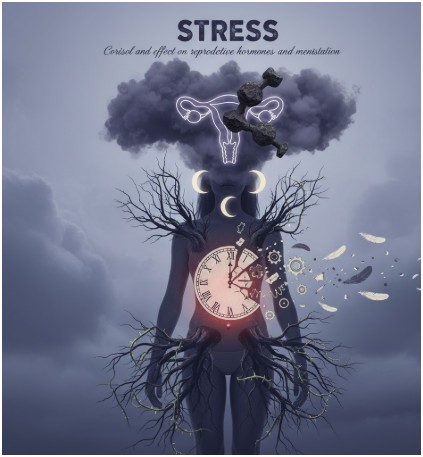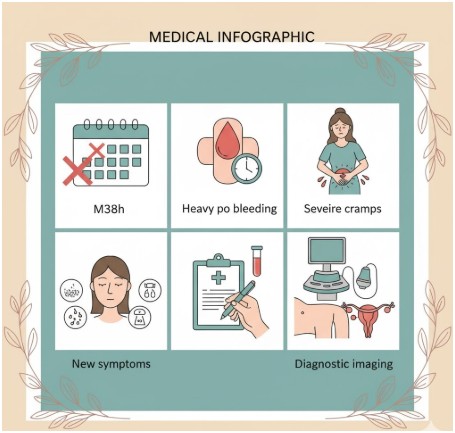For many women, the menstrual cycle is a reliable rhythm that comes and goes each month. But for others, it can be unpredictable — arriving early, showing up late, or skipping months entirely.
While it’s common to experience occasional fluctuations, consistently irregular periods may be your body’s way of signaling that something deeper is going on.
Understanding what causes these irregularities and how to address them can help you take better control of your health and well-being.
What Is Considered an Irregular Period?

A typical menstrual cycle lasts between 21 and 35 days, counting from the first day of one period to the first day of the next. Most women have fairly consistent cycles, but when that rhythm shifts noticeably, your period is considered irregular.
Irregularities may include:
- Cycles shorter than 21 days or longer than 35 days
- Missed periods (skipping a month or more without pregnancy)
- Unusually light or heavy bleeding
- Spotting between periods
- Periods that vary drastically in timing or flow each month
While an occasional off-cycle is normal — especially during puberty, after childbirth, or near menopause — frequent irregularities could be a sign of hormonal imbalance or other underlying conditions.
Common Causes of Irregular Periods

Your menstrual cycle is controlled by a delicate balance of hormones, mainly estrogen and progesterone. When that balance is disrupted, your periods can easily go off schedule. Here are some common causes:
1. Stress
Emotional or physical stress can have a profound effect on your hormones. The body responds to stress by producing more cortisol, which can suppress reproductive hormones and interfere with ovulation. As a result, your period might come late, be lighter, or disappear temporarily.
2. Weight Fluctuations and Diet
Both significant weight loss and weight gain can affect your menstrual cycle. Extremely low body fat can reduce estrogen production, leading to missed periods, while excess fat can increase estrogen levels, potentially causing heavy or unpredictable bleeding. Poor nutrition or restrictive diets can also impact hormonal balance.
3. Polycystic Ovary Syndrome (PCOS)
PCOS is one of the most common causes of irregular periods. It’s a hormonal disorder where the ovaries produce excess androgens (male hormones), which can interfere with ovulation. Women with PCOS may experience missed or very infrequent periods, acne, excess hair growth, and weight gain.
4. Thyroid Disorders
The thyroid gland helps regulate many body functions, including metabolism and hormone production. Both an overactive thyroid (hyperthyroidism) and an underactive thyroid (hypothyroidism) can cause irregular menstrual cycles.
5. Birth Control and Medications
Certain hormonal birth control methods, like pills, IUDs, or implants, can change the frequency and flow of your periods. It’s also common for cycles to take a few months to stabilize after starting or stopping hormonal contraception.
6. Perimenopause
As women approach menopause, hormone levels fluctuate significantly, which often results in shorter, longer, or skipped cycles. This natural transition can begin several years before menopause itself.
When to See a Doctor

While irregular periods are sometimes harmless, they can also signal underlying health conditions that need attention. You should consider seeing a healthcare provider if:
- You’ve missed three or more periods in a row and aren’t pregnant.
- Your bleeding is unusually heavy or lasts longer than seven days.
- You experience severe pain during your cycle.
- You notice new symptoms such as excessive hair growth, acne, or sudden weight changes.
A doctor can perform blood tests, pelvic exams, and imaging (like an ultrasound) to determine what’s causing your irregular cycles and recommend treatment options tailored to you.
Restoring Balance: Tips for Regulating Your Cycle

Getting your cycle back on track often starts with lifestyle adjustments and proper care. Here are a few practical steps to support hormonal balance:
- Manage Stress: Incorporate relaxation techniques like yoga, deep breathing, or meditation. Even short daily breaks can make a big difference.
- Maintain a Healthy Weight: Aim for a balanced diet rich in whole grains, lean proteins, healthy fats, and plenty of fruits and vegetables.
- Exercise Regularly (but Don’t Overdo It): Moderate activity supports hormonal health, but extreme exercise can sometimes suppress menstruation.
- Get Enough Sleep: Poor sleep affects your hormonal system just like stress does. Prioritize 7–9 hours per night.
- Track Your Cycle: Use a period tracker app or journal to note changes in timing, flow, and symptoms. This information can help you and your doctor identify patterns.
- Consider Medical Support: If lifestyle adjustments aren’t enough to restore your cycle, consult a trusted women’s health clinic in West Jordan. A qualified provider can evaluate your symptoms and may recommend hormonal therapy or medications tailored to your specific needs.
Listening to Your Body
Your menstrual cycle is more than a monthly inconvenience — it’s a vital sign of your body’s internal balance. When your periods become irregular, it’s worth taking the time to listen and explore why. Often, your body is sending you a message about your stress levels, nutrition, or hormonal health.
By understanding what’s behind your irregular cycles and making small but consistent lifestyle changes, you can help restore your body’s natural rhythm and feel more in tune with yourself — every month.









